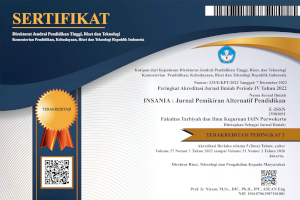REFORMULASI KEPEMIMPINAN PENDIDIKAN ISLAM DI ERA REVOLUSI INDUSTRI 4.0
DOI:
https://doi.org/10.24090/insania.v25i1.3751Keywords:
Reformulasi, Kepemimpinan Pendidikan Islam, Era Revolusi Industri 4.0Abstract
This article aims to provide an alternative solution to the world of education in the form of reformulation of Islamic education leadership in the industrial revolution 4.0. Industrial Revolution Era 4.0 is an era marked by the existence of a digital revolution that is a combination of various technologies that blur the lines of physical, digital and biological space. This era has implications for the increasingly sparse space and time and physical activity and communication at a geographical location. Everything changed from a manual to a digital one which turned out to have a significant impact on various lines of people's lives, including in the world of education. If the leadership of Islamic education is unwilling and able to adapt to this era, then Islamic education will be increasingly left behind. For this reason, it is necessary to reformulate Islamic educational leadership, namely through disruptive mindset, self-driving, and reshape or create steps. With these steps the leaders of Islamic education will be able to provide breakthroughs for the development of Islamic education and provide a guarantee of satisfaction for its users. The reformulation of Islamic education leadership also needs to be supported by strengthening users, strengthening strategies, and strengthening information and communication technology based on Islamic and applicable values ​​so that Islamic education is able to answer the hopes and needs of the community, not again limited to education that is sky-high but grounded education.Downloads
References
Afifuddin. Administrasi dan Supervisi Pendidikan. Bandung: Personal Press, 2008.
Atmosoedirdjo, Pradjoedi. Pengambilan Keputusan (Decision Making) Cet. IV. Jakarta: tp., 1976.
Burhanuddin. Analisis Administrasi, Manajemen, dan Kepemimpinan Pendidikan. Jakarta: Bumi Aksara, 1994.
Daradjat, Zakiah. Pendidikan Islam dalam Keluarga dan Sekolah. Jakarta: Ruhama, 1995.
Feidler A. Theory of Leadership Effectiveness. New York: Mc Grow Hill Book Company, 1967.
Muhammad, Haris. 2019. Manajemen Lembaga Pendidikan Islam dalam Menghadapi Revolusi Industri 4.0. Jurnal Manajemen Pendidikan, 1 (1): 45-57.
Indrafachrudi, Seokarto dkk, Pengantar Kepemimpinan Pendidikan, Surabaya: Usaha Offset Printing, 1993.
Juwariyah. Dasar-dasar Pendidikan Anak dalam Al-Qur’an. Yogyakarta: Teras, 2010.
Kasali, Rhenald. 2017. Disruption “Tak Ada yang Tak Bisa Diubah Sebelum Dihadapi Motivasi Saja Tidak Cukup†Menghadapi Lawan-Lawan Tak Kelihatan dalam Peradaban Uber. Jakarta: PT Gramedia Pustaka Utama.
Konz dan O’Donnel. Management, Terj. Antariksa, dkk. Jakarta: Erlangga, 1989.
Langgulung, Hasan. 1988. Pendidikan Islam. Jakarta: Pustaka Al-Husna.
Ma’arif, Syamsul. 2007. Revitalisasi Pendidikan Islam. Yogyakarta: Graha Ilmu.
Marno, Triyo Suppriyatno, Manajemen dan Kepemimpinan Pendidikan Islam, Bandung: Refika Aditma, 2008.
Muchtar, Heri Jauhari. Fikih Pendidikan. Bandung: Remaja Rosdakarya, 2005.
Mulyasa, E, Menjadi Kepala Sekolah Professional, Bandung: PT Remaja Rosdakarya, 2004.
Mulyono. Educational Leadership. Malang: UIN-Malang Press, 2012.
Nizar, Samsul. Memperbincangkan Dinamika Intelektual dan Pemikiran Hamka tentang Pendidikan Islam. Jakarta: Kencana, 2008.
Purwanto, Ngalim. Administrasi Pendidikan. Bandung: Rosdakarya, 1998.
Qomar, Mujamil, Manajemen Pendidikan Islam, Jakarta: Erlangga, 2009.
Ralph M. Stodgill, Handbook of Leadership. New York: The Free Press, 1974.
Roqib, Moh. Ilmu Pendidikan Islam. Yogyakarta: LKiS Yogyakarta, 2009.
Saebani, Beni Ahmad. Filsafat Manajemen. Bandung: Pustaka Setia, 2012.
Saefullah, U. Manajemen Pendidikan Islam. Bandung: Pustaka Setia, 2012..
Siagian, Sondang P. FIlsafat Administrasi. Jakarta: Haji Masagung, 1990.
Toha, Miftah. Kepemimpinan dalam Manajemen. Jakarta: Raja Grafindo Persada, 2012.
Umar, Bukhari. Ilmu Pendidikan Islam. Jakarta: Amzah, 2010.
Yunus, Mahmud. Pokok-pokok Pendidikan dan Pengajaran. Jakarta: Hidakarya Agung, t.t.
Zainuddin, Muhadi dan Abd. Mustaqim. Studi Kepemimpinan Islam: Konsep, Teori, dan Praktiknya dalam Sejarah. Yogyakarta: SUKA-Press UIN Sunan Kalijaga, 2012.
Downloads
Published
How to Cite
Issue
Section
License
Authors who publish with this journal agree to the following terms:
Authors retain copyright and grant the journal right of first publication with the work simultaneously licensed under a Creative CommonsAttribution-ShareAlike License that allows others to share the work with an acknowledgment of the work's authorship and initial publication in this journal.
Authors are able to enter into separate, additional contractual arrangements for the non-exclusive distribution of the journal's published version of the work (e.g., post it to an institutional repository or publish it in a book), with an acknowledgment of its initial publication in this journal.
Authors are permitted and encouraged to post their work online (e.g., in institutional repositories or on their website) prior to and during the submission process, as it can lead to productive exchanges, as well as earlier and greater citation of published work (See The Effect of Open Access).








